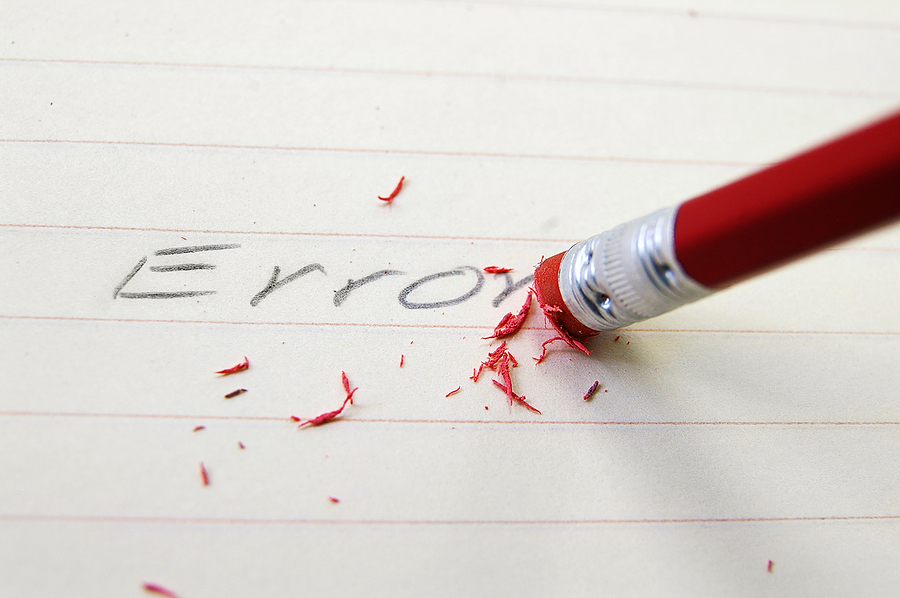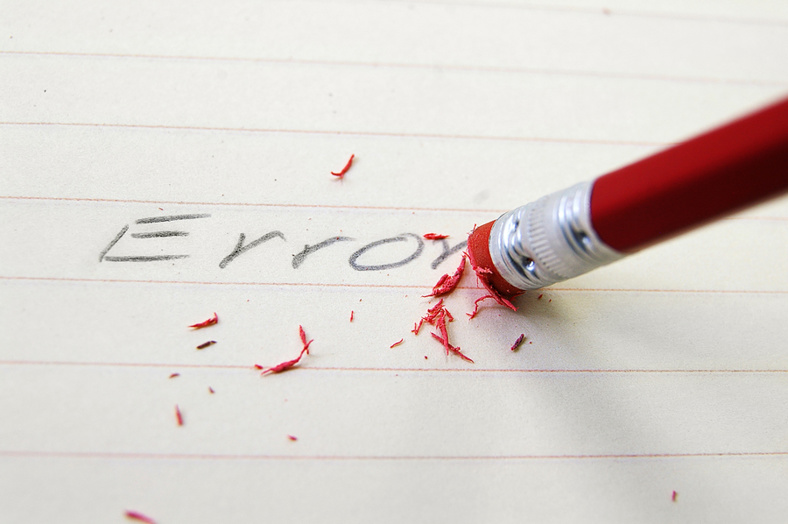We all know the cliché, "To err is human." In most cases, this statement is quite true. When there is something really terrible, often this is explained by a human error: people are the reason of 70% of air crashes, 90% car accidents, and 90% other emergencies. Name almost any mistake, and it turns out that there are guilty people. Once this fact is discovered, further investigation is usually terminated. This is terribly wrong, at least if we similar accidents not to happen again.
By the way, very often people are not to blame for their own mistakes - well, not fully. Assessing the way we see, remember and perceive the world around us, we can say that we all tend to distort reality, and that forces us to make a particular type of error.
For example, a right-hander entered an unfamiliar building is inclined to decisively turn right, although it is possibly not the best route. In addition, most of us – no matter left- or right-handed - always prefer to choose number seven and blue for some inexplicable reason.
Our expectations often shape our outlook, and often determine our actions and deeds. For example, in one study different groups of people was differently presented a same man. Then the experiment participants were asked to recall what he looked like. So, those who were told he was a truck driver, described him as a pretty big guy; and those that thought he was a dancer remembered that the man was a fine physique.
Here's another case. Half of a restaurant’s visitors was given a welcome cocktail and told this is excellent California wine. The second half got the same wine but presented as an ordinary wine from North Dakota. The last not only ate less that the evening, but also left the restaurant before those who thought they drink a sophisticated wine.
Even those who are considered to be calm and even phlegmatic people (such as farmers) are inclined to be biased sometimes. It turned out, that members of this profession - adherents of the theory of global climate change - believe that the weather was warmer than actually recorded. And what about those who do not believe in global warming? These farmers are convinced that the temperature was below the registered statistics.
Of course, we do not tend to assume that all truckers are larger than dancers, and it is not necessary to memorize the weather (unless you do not like to bet on any occasion). It is important that we show bias mostly unconsciously, not even understanding it. This trend is so strong that we cannot help it even knowing about our prejudice.
Apparently, the bias and distortions of this kind are deeply rooted in our minds. Many of qualities that allow a man to do a variety of things have a downside, initially predisposing us to errors.
For example, we usually perfectly possible to evaluate the current situation. Sometimes it takes a second or even fractions of a second to evaluate a scene’s true meaning and significance. However, we are paying a very high price for such a hasty analysis, overlooking a number of significant details. What’s the most important - we do not even suspect that something is missed, it seems to us that we have seen everything.
However, it is not.
A movie offers us a good example. Movies are known to be shots on film and consist of a long series of individual frames projected onto the screen at twenty four frames per second. When the ribbon is scrolled, we see not individual still pictures but moving images. This, of course, is a "good" bug; we do not mind that it’s wrong; in fact, we even like it. Yet, if such an error is made by an oncologist peering at the patient's X-rays to find a tumor, or a customs officer at the airport, revealing prohibited items in luggage of passengers, it leads to disastrous consequences.
We all are failing at least once in life. Out of fear to make a mistake, we do not take action to achieve our desires, and it is worse than trying to be wrong. We reduce our own chances of success.
But are failures are that bad? If we were always right, how would we learn? No matter whether this is our own or somebody else’s mistake, it makes us aware about how to avoid them and not to repeat again and again.
The only reason for which human kind surpassed other animals is our ability to learn from our mistakes. Thomas Edison made 999 mistakes before he created the light bulb. What would happen if he gave up after the first, second, tenth, hundredth or five hundredth attempt? The inventor would be anyone else, but not Edison!
Edison’s lesson cannot be underestimated. This is one of the best examples of perseverance. As Edison said he was not wrong 999 times, he simply found 999 variants that did not work, so let’s take our cue from him. If we do something wrong, we do not need to give up, but rather understand what went wrong, and not to repeat this error next time.
based on “Why We Make Mistakes. How We Look Without Seeing, Forget Things in Seconds, and Are All Pretty Sure We Are Way above Average” by Joseph T. Hallinan
By the way, very often people are not to blame for their own mistakes - well, not fully. Assessing the way we see, remember and perceive the world around us, we can say that we all tend to distort reality, and that forces us to make a particular type of error.
For example, a right-hander entered an unfamiliar building is inclined to decisively turn right, although it is possibly not the best route. In addition, most of us – no matter left- or right-handed - always prefer to choose number seven and blue for some inexplicable reason.
Our expectations often shape our outlook, and often determine our actions and deeds. For example, in one study different groups of people was differently presented a same man. Then the experiment participants were asked to recall what he looked like. So, those who were told he was a truck driver, described him as a pretty big guy; and those that thought he was a dancer remembered that the man was a fine physique.
Here's another case. Half of a restaurant’s visitors was given a welcome cocktail and told this is excellent California wine. The second half got the same wine but presented as an ordinary wine from North Dakota. The last not only ate less that the evening, but also left the restaurant before those who thought they drink a sophisticated wine.
Even those who are considered to be calm and even phlegmatic people (such as farmers) are inclined to be biased sometimes. It turned out, that members of this profession - adherents of the theory of global climate change - believe that the weather was warmer than actually recorded. And what about those who do not believe in global warming? These farmers are convinced that the temperature was below the registered statistics.
Of course, we do not tend to assume that all truckers are larger than dancers, and it is not necessary to memorize the weather (unless you do not like to bet on any occasion). It is important that we show bias mostly unconsciously, not even understanding it. This trend is so strong that we cannot help it even knowing about our prejudice.
Apparently, the bias and distortions of this kind are deeply rooted in our minds. Many of qualities that allow a man to do a variety of things have a downside, initially predisposing us to errors.
For example, we usually perfectly possible to evaluate the current situation. Sometimes it takes a second or even fractions of a second to evaluate a scene’s true meaning and significance. However, we are paying a very high price for such a hasty analysis, overlooking a number of significant details. What’s the most important - we do not even suspect that something is missed, it seems to us that we have seen everything.
However, it is not.
A movie offers us a good example. Movies are known to be shots on film and consist of a long series of individual frames projected onto the screen at twenty four frames per second. When the ribbon is scrolled, we see not individual still pictures but moving images. This, of course, is a "good" bug; we do not mind that it’s wrong; in fact, we even like it. Yet, if such an error is made by an oncologist peering at the patient's X-rays to find a tumor, or a customs officer at the airport, revealing prohibited items in luggage of passengers, it leads to disastrous consequences.
We all are failing at least once in life. Out of fear to make a mistake, we do not take action to achieve our desires, and it is worse than trying to be wrong. We reduce our own chances of success.
But are failures are that bad? If we were always right, how would we learn? No matter whether this is our own or somebody else’s mistake, it makes us aware about how to avoid them and not to repeat again and again.
The only reason for which human kind surpassed other animals is our ability to learn from our mistakes. Thomas Edison made 999 mistakes before he created the light bulb. What would happen if he gave up after the first, second, tenth, hundredth or five hundredth attempt? The inventor would be anyone else, but not Edison!
Edison’s lesson cannot be underestimated. This is one of the best examples of perseverance. As Edison said he was not wrong 999 times, he simply found 999 variants that did not work, so let’s take our cue from him. If we do something wrong, we do not need to give up, but rather understand what went wrong, and not to repeat this error next time.
based on “Why We Make Mistakes. How We Look Without Seeing, Forget Things in Seconds, and Are All Pretty Sure We Are Way above Average” by Joseph T. Hallinan















